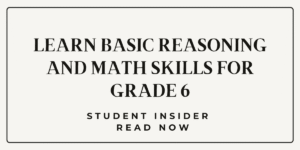📘 Mastering Mathematics from Class 6 to 8: A Smart Guide for School and Competitive Success
Mathematics is more than just numbers—it’s the language of logic, problem-solving, and analytical thinking. For students in Class 6 to 8, this is the perfect time to build a strong foundation that not only helps in school exams but also prepares them for future competitive exams like NTSE, Olympiads, and entrance tests.
In this blog, we’ll explore how to effectively learn maths from Classes 6 to 8, combining school syllabus with smart strategies for competitive edge.
🧱 Build Strong Basics First
Mathematics is like a building—you can’t build the top floor without a solid base. Ensure you understand:
- Number systems
- Fractions and decimals
- HCF & LCM
- Percentages
- Basic algebra and geometry
Use your school textbook (like NCERT) as the primary source. These cover all core topics clearly and are also useful for most Olympiads and scholarship exams.
CLICK TO DOWNLOAD BELOW
📏 Concept Before Calculation
Many students try to memorize formulas without understanding them. This is a big mistake.
For example, don’t just memorize the formula for the area of a triangle; understand why it’s (½ × base × height). Use visuals, real-life examples, and puzzles to grasp concepts.
Once your concept is clear, practice it through problems of increasing difficulty.
📝 Practice Daily
Math is not a subject you can cram overnight. Daily practice is the key.
- Spend at least 30–45 minutes a day solving math problems.
- Solve examples first, then attempt the exercise questions.
- Use extra worksheets, guidebooks, and Olympiad practice books.
For competitive exams, try books like:
- R.S. Aggarwal (Maths for Class 6–8)
- MTG or SOF Olympiad books
- NCERT Exemplar for deeper thinking
⏱️ Focus on Speed and Accuracy
Competitive exams test both how well and how fast you solve. To improve:
- Time yourself while solving worksheets.
- Use tricks for mental maths (like Vedic Maths techniques).
- Regularly take mock tests to simulate real exam pressure.
🧠 Learn to Think, Not Just Solve
Math teaches logical thinking. Try:
- Puzzles and brain teasers
- Sudoku or math games online
- Coding basics (to improve logic)
These activities make maths fun and sharpen your brain, which is a big advantage in Olympiads and school exams.
👨🏫 Ask, Discuss, and Clear Doubts
Never leave a doubt unsolved. Discuss with:
- Teachers
- Friends
- Online platforms (like YouTube, Math learning apps)
There are many free resources available today that explain maths concepts in simple ways using animation and storytelling.
🏆 Prepare for Olympiads and NTSE
Class 6 to 8 is a great time to start preparing for:
- SOF IMO (International Maths Olympiad)
- NTSE (for Class 10, but early prep helps)
- NSTSE, RMO (for advanced learners)
Even if you don’t win at first, attempting these tests builds confidence, speed, and exposure. Learn maths online
✅ Final Words
Mathematics for Classes 6 to 8 is not just about school marks—it’s a launchpad for your future learning and competitive success. With a mix of concept clarity, daily practice, and smart problem-solving, any student can excel in maths.
So, pick up that pencil, open your notebook, and start enjoying the world of numbers—because maths isn’t tough when it’s learned the right way.
What is Digital Literacy and its Important
Digital Literacy and Its Importance Today Digital literacy in India refers to the ability to…
Learn Local Self Governments for Competitive exam
Local Government MCQ Quiz Local Government – 50 MCQ Quiz Submit Quiz Summary Before Lord…
FCI Grade III General Phase I Mock Test
FCI Grade 3 — General English Phase 1: Mock Test FCI Grade 3 — General…
SEBI – RBI – NABARD Descriptive Q & A 2025
20 descriptive Q&A (150 words each) on the objectives and functions of SEBI, NABARD, and…
Current affair National & International 2025
Organizations & Current Affairs Quiz National & International Organizations and Current Affairs Quiz 1. What…
How to become an Investment Bankers in india
To become an Investment Banker in India, there is no single fixed course, but a…









